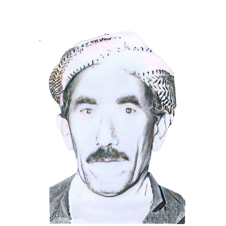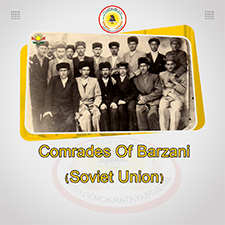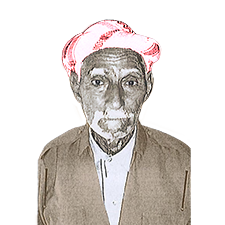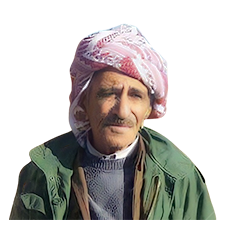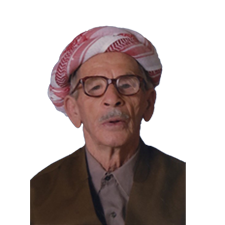Biography:
Khdr Khalakani was born in 1992 in the village of khalakani which was a part of the city of Erbil. He studied in the Soviet Union, and he received his certificate in the agricultural department. Moreover, he married a woman by the name of Nadia in the Soviet Union as well.
Following his return as an immigrant from Iran, Khdr was employed in the agricultural office of Choman. After that, he was transferred to Soran in 1981. Khdr’s language skills were remarkable as he knew Kurdish, Arabic, and Russian. He was buried in the cemetery of Soran in 1987.
:Service Record
In 1994, before he participated in any revolution, he was part of the army of Iraq in Rawandz. In the same year, Khdr fled from the army/deserted the army and contacted the soldiers of the second Barzani revolution and participated in their struggles to reclaim their freedom.
Because of his involvement in the revolution, on the 19th of August in 1945, the court of “urfi Sarbazi” took possession of all his belongings. Moreover, On the 11th of October in 1945, after the fall of the second Barzani revolution, Khdr travels to east Kurdistan along with his family and Mustafa Barzani. Furthermore, he joins the ranks of the Barzani army in The Republic of Kurdistan on 31st of March in 1946. Additionally, on the 29th of April of the same year, he fought in the battle of “Qaraw” in Saqz.
Following the fall of the Kurdistan Democratic Party (KDP) in Mahabad and the return of Barzani from eastern Kurdistan to southern Kurdistan, Khdr participated in the battles of “Naghada” and “Shno” in eastern Kurdistan. Also, he was one of those peshmergas on 19/4/1947 who went through the road of “Khwakurk u Dashti Baraz grawa” on the land of northern Kurdistan to return to “Sherwan” and “Mzuri”. After their return, General Mustafa Barzani on 15/5/1947 in the village of “Argush” conducted a meeting with his comrades and granted them freedom in whether to stay or go to the Soviet Union. In the meeting, everyone decides to leave and go to the Soviet Union. On the 23rd of May in 1947, Khdr travels with General Mustafa to the Soviet Union and fights in the battles of “Gali Qtur” and the “Mangoor”. After a lot of hardships, on the 18th of June in 1947, Khdr was able to travel to the Soviet Union after passing through the Aras River which was between the borders of Iran and the Soviet Union.
After their arrival to the Soviet Union on the 19th of June in 1947 in the city of “Nakhchawan” in the Republic of Azerbaijan, all of the comrades were placed in a community that was surrounded by barbed wire. They were being monitored by the soldiers and were treated like hostages of war when it came to food and clothes. Afterwards, the Soviet government decided that the comrades should be divided into the places of “Aghdam”, “Lachin”, “Ayulax” and “Kalbajar” in the Republic of Azerbaijan. On the 10th of December in 1947, they were transported to a military camp on the lake of “Khazar” in the capital of the Republic of Mahabad “Bakor”. On the 23rd of the same month, they were given military clothes and were trained by the officers of the republic 8 hours a day. On top of that, some of the comrades that were literate in Kurdish would teach the language for 4 hours a day.
After the ill-treatment of “Jaafar Baqrov” with the comrades, on the 29th of August in 1949, Barzani decides to transport his military camp from the republic of Mahabad to a “Chrchuk” community near the city of “Ashkand” which was the capital of Uzbekistan; there they continued their military practices.
In March of 1949, the comrades were divided into the villages of the Soviet Union and farms (where civilians would rent them from the governments and pay them back later). The comrades were working in these places.
Following multiple letters to Stalin by General Barzani, a letter finally reaches Stalin where it talks about the hardships the comrades are going through. Stalin immediately creates a party to investigate the comrades of Barzani; the party comes to the decision that everyone should gather in the city of “Vrivsky”. Everyone travels to the city in November of 1951.
After the revolution of the 14th of July in 1958 in Iraq and the return of General Mustafa Barzani on the 25th of February in 1959, Barzani and his comrades were granted full amnesty by the government.
Because of the creation of the Republic of Iraq in 1958 by Abdul Kareem Qasim, Khdr along with his comrades travelled back to Kurdistan with the ship “Grozya” through the harbor of “Basra” on the 16th of April in 1959.
Khdr fought bravely in the revolution of “Aylul” and the battles of “Hassan Bag”, “Sartiz”, “Handren”, and “Garooy Beshi”. Following the fall of “Alyul’ revolution, he migrated to Iran in 1975. After being an immigrant for a year, he returns to Kurdistan, and the government of Iraq transferred him to southern Iraq. He was buried in the village of “Sgur” in the city of “Nasrya”.
Sources:
-
حیدر فاروق السامرائي، ضیاء جعفر ودوره السیاسي و الاقتصادي في العراق، (لندن – دارالحكمة - ٢٠١٦م).
-
شهعبان عهلی شهعبان، ههندێك زانیاری سیاسی و مێژوویی، چاپی سێیهم، (ههولێر - چاپخانهی رۆژههڵات - ٢٠١٣ز).
-
صالح یوسف صوفي، كرۆنۆلۆژیا كوردستانێ و جیهانێ، چاپا ئێكێ، بهرگێ دووێ، (دهۆك - چاپخانا پارێزگهها دهۆكێ - ٢٠١٣ز).
-
صالح یوسف صوفي، كرۆنۆلۆژیا كوردستانێ و جیهانێ، چاپا ئێكێ، بهرگێ سێ، (دهۆك - چاپخانا پارێزگهها دهۆكێ - ٢٠١٣ز).
-
عمر فاروقی، سردار دانا زندگی و مبارزات مرحوم ملا مصطفی بارزانی، چاپ دوم، (ههولێر - چاپخانهی وزارت آموزش و پرورش - ٢٠٠٢ز).
-
عهبدولڕهحمان مهلا حهبیب ئهبوبهكر، عهشیرهتی بارزان له نێوان ١٩٣١-١٩٩١، چاپی یهكهم، (ههولێر - چاپخانهی وهزارهتی رۆشنبیری - ٢٠٠١ز).
-
عهبدولڵا غهفور، فهرههنگی جوگرافیای ههولێر، (ههولێر - بڵاوكراوهكانی ئهكادیمیای كوردی - چاپخانهی حاجی هاشم - ٢٠١٥ز).
-
كاروان محهمهد مهجید، بارزانییهكان له مههابادهوه بۆ سۆڤێت، چاپی یهكهم، (سلێمانی - چاپخانهی پهیوهند - ٢٠١١ز).
-
مسعود بارزانی، بارزانی و بزوتنهوهی رزگاریخوازی كورد ١٩٣١-١٩٥٨، (دهۆك - چاپخانهی خهبات - ١٩٩٨ز).
-
نهجهف قولی پسیان، له مهابادی خوێناوییهوه ههتا لێوارهكانی ئاراس، و. شهوكهت شێخ یهزدین، چاپی یهكهم، (پیرمام - یۆبیلی زێڕینی پارتی دیموكراتی كوردستان - ١٩٩٦ز).
-
ئـ.د.ئـ، فایلی ژماره AI-10، لیستی ههڤاڵانی مستهفا بارزانی بۆ یهكێتی سۆڤێت، بهڵگهنامه لهلایهن سهگڤان هاڵۆ پێشكهش كراوه، ٢٠١٦ز.
-
ئـ.د.ئـ، فایلی ژماره HB-118، پارتی دیموكراتی كوردستان، بارهگای بارزانی، لێژنهی باڵای ناوچهی بارزان، فۆرمی خزر حهسهن عهباس خزر، پیرمام، ١ تشرینی دووهمی ٢٠١٨ز.
-
ئـ.د.ئـ، فایلی ژماره ZB-179، دهقی چاوپێكهوتن لهگهڵ محهمهدئهمین خزر حهسهن لهلایهن نهزیره مێرگهسۆری، پیرمام، ٢١ كانوونی دووهمی ٢٠١٠ز.




